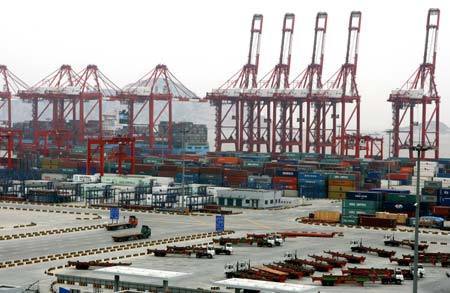VII-5 Question: Historical data show that before 1979, China's foreign exchange reserves had never exceeded US$1 billion. Now, the reserves are over $1 trillion, the largest in the world. How is China going to use such huge reserves?
A: Before 1979, China's foreign exchange reserves had never exceeded $1 billion. Under the reform and open policy, China's economy and foreign trade have grown rapidly, and so have its foreign exchange reserves. China's foreign exchange reserves surpassed $100 billion in 1996, US$200 billion in 2001 and reached US$1.066 trillion by the end of 2006, when China overtook Japan to become the largest holder of foreign exchange reserves in the world.
The amount of foreign exchange reserves is an indicator of a nation's financial and comprehensive strength. Foreign exchange reserves of over US$1 trillion reflect China's strong international payment ability and the ability to influence the world economy. Nevertheless, how to manage such a huge stockpile is indeed a new challenge for China.
Many people outside China are concerned with how China is going to come up with new ways to use the reserves. Seventy percent of China's foreign exchange reserves are denominated in U.S. dollars. The devaluation of the U.S. dollar impacts China's foreign exchange reserves. In the past few years, China has switched some instruments denominated in U.S. dollar into those denominated in other currencies such as South Korean won. To reduce foreign exchange risk, we cannot put all our eggs in one basket. Otherwise, economic fluctuations will incur heavy losses to the Chinese people as well as foreign investors. Nevertheless, it is clear that there is no need for China to restructure its foreign reserves portfolio dramatically.
In addition, China will further loosen restrictions on the holding and trading of foreign currencies by institutions and individuals. To facilitate small volume exchanges between yuan and other currencies, China will set up pilot companies that specialize in foreign exchange business. In the meantime, China will speed up the formation of the foreign exchange trading market and encourage the development of new financial products such as yuan/foreign currencies exchange options and futures.
China is also going to establish a national overseas investment company to manage the country's foreign exchange reserves according to relevant Chinese laws. The central government will supervise the company. At present, China is inexperienced in investing overseas. Up to the end of 2006, China's foreign direct investment (excluding the investment in foreign financial market, such as stocks or bonds) was US$73.3 billion. This amount is trivial, compared with developed countries. Hence, China will encourage firms to invest overseas and in particular to acquire foreign firms in key industries and encourage banks, insurance companies and securities companies to expand their investment overseas.
To speed up the innovation of basic industry technology, China will introduce a large amount of advanced technology and equipment from developed countries, or even acquire factories and research and development institutes with advanced technologies and equipment. In a word, there are many ways that China can use the foreign exchange reserves.

(China.org.cn)